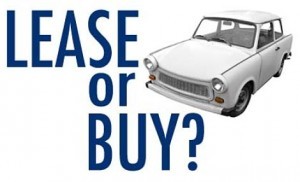 Should you lease or buy your next vehicle? This is a commonly asked question and one you may want to consider for more than just the tax benefits.
Should you lease or buy your next vehicle? This is a commonly asked question and one you may want to consider for more than just the tax benefits.
But let’s start with the tax side of things. This is assuming your vehicle is used 100% for business purposes.
LEASE: $950 before tax per month is the maximum you can claim so the total deduction for the year would be $11,400 before tax.
PURCHASE: Regardless of the purchase price, the maximum value of a passenger vehicle is $36,000 before tax. If you choose not to claim the full amount using the accelerated depreciation, the first year you can claim depreciation of $16,200, second year $5,940, third year $4,158 and fourth year $2,911. Plus, after four years, there is still a tax value of $6,791.
The maximum value of a Class 54 zero-emission passenger vehicle is $61,000 before tax. If you choose not to claim the full amount using the accelerated depreciation, the first year you can claim depreciation of $9,150, second year $15,555, third year $10,889 and fourth year $7,622. Plus, after four years, there is still a tax value of $17,784.
The amount of interest paid on loans to purchase passenger vehicles is also limited to $300/month.
As you can see the write off for tax purposes does vary between the two. A decision like this should be based on more than just the immediate tax savings. Here are a few of the things that I consider:
- Long term cash flow – With a lease, you will always have a monthly car payment whereas if you finance it, the payments will stop after the term of the lease, thereby freeing up your cash for other things, like a nice vacation.
- Interest – Interest rates have been on the rise recently but that can change anytime, as we saw historical lows for many years previously. Of course, the business portion of the interest will be deductible for tax too, but only up to the maximum amount.
- New car syndrome – Do you like having a new car every few years? If so, then having a monthly car payment may never be an issue. But if you plan to keep it for a long time, then you might prefer to own it after 4-7 years of paying for it. Yes that’s right, many purchase finances can now be done over 7 years although you may want to see what the interest difference is…it may not be worth saving $50/month when there are a few extra years on the term.
- Owning vs. renting – Leasing is like renting; you never own it. Life happens and sometimes there are job changes or jobs lost, illnesses, etc. Will you be able to afford another lease or is it better to own what you’ve already been paying for until you get back on your feet? Lots can happen in a few short years so to make a decision based on tax write-offs alone may not be the best decision.
- Monthly payments – Generally speaking, the monthly payments for a purchase finance are higher than a lease. Why? When you purchase the vehicle, you are borrowing the total amount of the car. A lease, on the other hand, is based on the difference between the purchase price and the value of the car at the end of the lease so the amount being financed is quite a bit less. However, when people go car shopping, they often compare the monthly payment of a purchase to a lease and often times because the lease is lower, they will upgrade which makes the lease payment higher in the end. For that reason, I have yet to see a difference in the monthly payment, whether it is leased or financed.
- Buyout – Most leases will have a buyout option should you decide to keep it and in many cases, the buyout is more than the car is worth. If life happens and you are not in a position to re-lease or purchase, you may end up without a vehicle after making payments for a few years.
- Lease restrictions – Many leases have an allowable amount of kms that can be driven and anything over and above are charged at a specified rate. Will you go over the allowed amount and have an extra payment when you go to renew the lease or turn in the car?
Cash flow is always a consideration too. An article in the Globe and Mail, has a great illustration on the cost of purchasing vs. leasing. Basically, it showed that after 10 years you will potentially save about $14,000 plus the value of the car when you purchase as opposed to leasing. As the article was written in 2011, the numbers have obviously changed but it’s worth running the numbers using the current tax rates and options to determine what is best for your own situation.
***This blog is for information only and not to be used as tax advice or planning without first seeking professional advice. Information is subject to change without notice.
